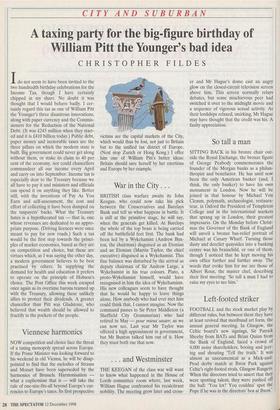CITY AND SUBURBAN
A taxing party for the big-figure birthday of William Pitt the Younger's bad idea
CHRISTOPHER FILDES
Ido not seem to have been invited to the two hundredth birthday celebrations for the Income Tax, though I have certainly chipped in my share. No doubt it was thought that I would behave badly. I cer- tainly regard this tax as one of William Pitt the Younger's three disastrous innovations, along with paper currency and the Commis- sioners for the Reduction of the National Debt. (It was £243 million when they start- ed and it is £410 billion today.) Public debt, paper money and inexorable taxes are the three pillars on which the modern state is built. Big government could never get along without them, or stake its claim to 40 per cent of the economy, nor could chancellors commandeer all our income every April and carry on into September. Income tax is especially dear to the Treasury because we all have to pay it and ministers and officials can spend it on anything they like. Better still, with the inventions of Pay As You Earn and self-assessment, the cost and effort of collecting it have been dumped on the taxpayers' backs. What the Treasury hates is a hypothecated tax — that is, one whose revenues are dedicated to an appro- priate purpose. (Driving licences were once meant to pay for new roads.) Such a tax would be the first step towards the princi- ples of market economics, based as they are on competition and choice, but these are virtues which, as I was saying the other day, a modern government believes to be best practised by others. In supplying the demand for health and education it prefers to operate on the principle of Hobson's choice. The Post Office this week escaped once again as its overtime barons teamed up with the Treasury, allowing these unlikely allies to protect their dividends. A greater chancellor than Pitt was Gladstone, who believed that wealth should be allowed to fructify in the pockets of the people.










































































 Previous page
Previous page